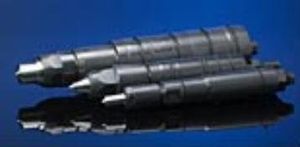
Plunger pump fuelelectricindustrial
Add to favorites
Compare this product
Characteristics
- Technology
- plunger
- Fluid
- fuel
- Operation
- electric
- Domain
- industrial
- Applications
- injection
- Other characteristics
- rotary, mechanical
- Pressure
1,800 bar
(26,106.793 psi)
Description
Pumps which are used for the injection of fuels into diesel engines rank among the technically most demanding members in the family of pressure generators. The provision of fuels under high pressure to common-rail injectors and fuel injection valves calls for robust dimensioning of the pump drives, the determination of optimum clearance in the pump element and the application-oriented selection of high-strength steels with special heat treatment processes. As well, L'Orange pumps are characterised by expertise developed over decades in terms of helices (in the case of conventional pump-line-nozzle systems (PLN)), component coatings, sealing elements or valve engineering.
As early as in the preliminary design phase, the results obtained combining hydraulic simulation and finite elements analysis provides clear-cut data on delivery rates and efficiency levels, component loads or lifetimes as well as the minimum surface pressures necessary for sealing. Conventional jerk pumps driven by engine camshafts with optimized helices have been significantly influenced in their development by L'Orange. They have been part of our program for over 60 years and today still form an important basis for all other pump concepts.
A further development that has resulted from this is the twin-plunger pump with two control racks that are controlled separately. This concept allows the engine thermodynamics engineer to adjust the start and end of injection independently of each other. Pumps for alternative fuels are also based on jerk pump technology.
Catalogs
No catalogs are available for this product.
See all of L'Orange‘s catalogs*Prices are pre-tax. They exclude delivery charges and customs duties and do not include additional charges for installation or activation options. Prices are indicative only and may vary by country, with changes to the cost of raw materials and exchange rates.



